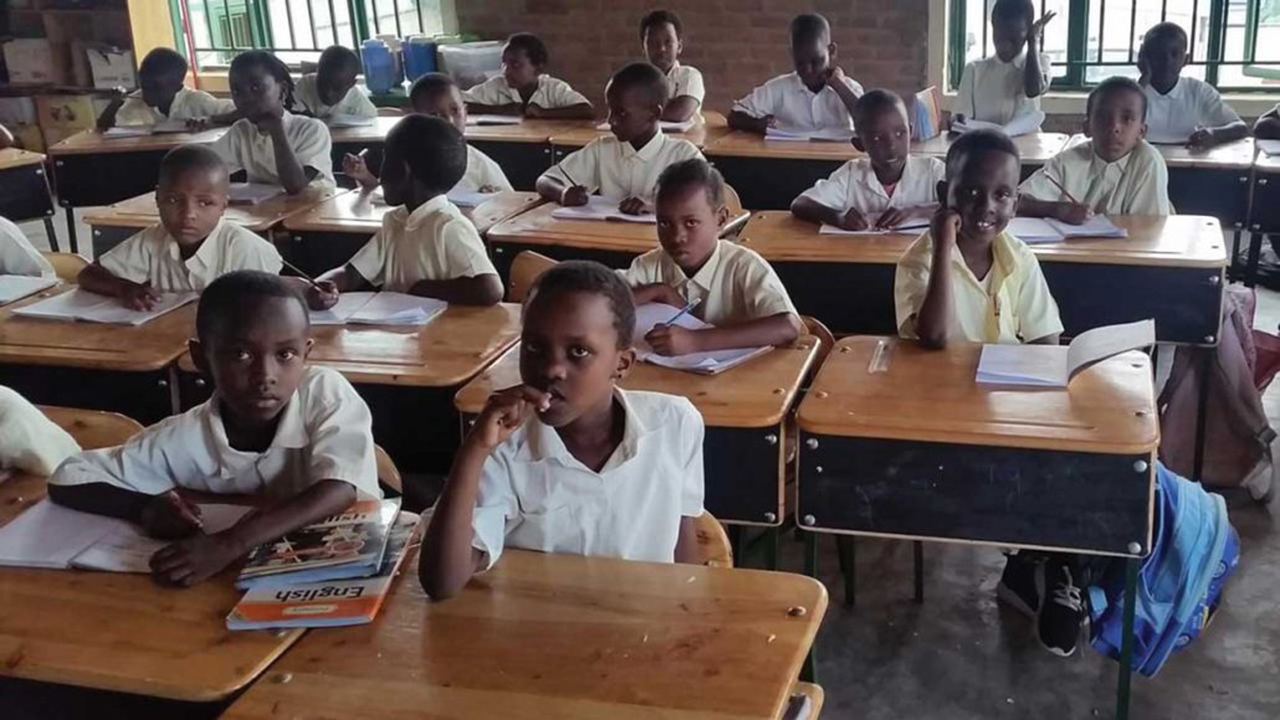
AS soon as the Rev. Father was done with the prayers and took his seat at the sanctuary, two young students of the Pacelli School for the Blind and Partially Sighted Children, guided by a Rev. Sister, mounted the lectern to take the first reading.
Clutching braided papers containing the readings of the day and Responsorial Psalm, as soon as they got hold of the lectern, they took charge; all the Rev. Sister did was adjust the microphone to their level. In amazement, the congregation watched as the first student took the reading flawlessly, while the second rendered a melodious responsorial Psalm that got everyone singing.
The event was a friend’s birthday thanksgiving service at the Our Lady Queen of Apostles Parish, Ilupeju, Lagos. Being a charity worker, he had invited the visually impaired students to be part of the celebration. From Ilupeju, the celebration moved to the Old Peoples Home at the Regina Mundi Catholic Church, Mushin Lagos, where again, the students, now joined by other members of their band, wowed guests with live performance. It was sooo emotional watching these students manipulate the instrument to produce melodious tune. From the keyboardist to drummer, percussionist, and singers… these kids clearly demonstrated that there’s ability in disability.
Out of curiosity, there was an urge to go on a special mission to the Pacelli School for the Blind and possibly unearth the ‘mystery’ behind their surprising performance that got most guests talking.
Locating the school was no big deal; almost all the okada riders within Surulere axis know the way to their Ajao Road compound. At this time, the gate was wide open, with two uniformed security men on guard. After a brief introduction, this reporter was ushered into the Principal’s office. Unfortunately, Rev Sister Jane Onyeneri was not on seat.
“The principal is not around, I suggest you come back another time. But if you wish to wait, there’s no problem. It is always better to see her during morning hours,” the secretary, who was attending to one of their prospective students, said.
With an assurance, that the principal had not closed for the day, waiting was just the right option. As it turned out, the wait was an opportunity to observe the students in their natural environment; it was their lesson period. One by one, group by group, the students (both boys and girls), tramped from their dormitories, through a walkway into their various classrooms. From groups out of the hostels, they all eventually dispersed into their individual classes without any guide; it was like magic.
Specifically, their sixth sense works in an amazing way. While on the walkway, they know exactly when they are drifting into the lawn; they know exactly when and where to make a turn. In fact, this reporter was perturbed when one of the boys ran from the classroom block to the hostel area clutching a brown paper. In the process, the paper dropped. He stopped, made a swift turn, waited for a few seconds as if switching on his spiritual eyes, and reached out for the paper on the lawn. Truly, impossibility is nothing.
About 30 minutes later, the principal returned. Luckily, she offered to speak with The Guardian immediately, as against the original plan of securing an interview date. For close to an hour, the Rev. Sister spoke passionately about the activities of the school, the challenges and the joy of giving ‘eyes’ to the blind.
An initiative of the then Catholic Archbishop of Lagos, Leo Hale Taylor, Pacelli School for the Blind and Partially Sighted, was officially opened on June 16, 1962, following a permission granted on April 26 of same year by the Nigerian government for the establishment of a special school for the education of the visually impaired.
Named after the then serving Pope Pius XII, Eugenio Pacelli, the first administrators of the school include, Rev. Fr. Dempsey, a Dominican priest, who was the manager, with Rev. Sr. Mary de Chantel of the Irish Sisters of Charity, a Catholic religious congregation of women in Ireland, as the principal. The Rev. Sisters from Ireland remained the administrators until 1980, when the Handmaids of the Holy Child Jesus; an indigenous religious congregation replaced them. They have continued with the administration of the school till date.
Record shows that, at the time, when all schools in Nigeria were taken over by the Federal Government, Pacelli was placed under the Lagos State. However, during this period, the quality of education deteriorated and the welfare of the students, as well as the maintenance of the structures, were neglected. It was the former Archbishop of Lagos, Anthony Cardinal Olubunmi Okogie, who had great sympathy towards the less privilege and handicapped, that officially requested for the return of the school to the Catholic mission in 1997.
And since then, the maintenance and education of this category of persons has been the sole responsibility of the Catholic Mission, supported by kindhearted individuals, religious groups and corporate organisations.
The schools began with four students, but today, it has graduated many who have since found their bearing in the society. Currently, there are 135 students, with staff strength of 38. There are five Rev Sisters working with the team and the school is run solely through charity. Yet, admission is free!
Pacelli runs a primary school system, though with a rehabilitation programme for secondary school students. But whether for primary or rehabilitation programme, there are strict procedures for admission. For rehabilitation, the students are usually kept for one year to teach them brail reading and writing, orientation and mobility, daily living skills, typing, music and others. Once they mastered these skills, they are graduated under basic six free.
As for primary school pupils, the procedure is slightly different.
“The school is open for everybody, but you must be up to seven years before we take you here; we take from seven to 17 years. But those from secondary school, we take between 13, 14, 15 and 16; we don’t want to take 18 because they will be problematic to us and you know we have young ladies,” an officer of the school hinted.
Though the pupils are meant to return to their families after graduation, a good number of them still live within the school premises; you could tell by their size and maturity.
“Some of them have been here for seven to eight years; we don’t push them until we are sure they’ve mastered the skill before we move them,” she said.
Even when you are of age to join Pacelli, you must undergo a series of medical tests before moving into the premises.
“We want to know how you became blind; we want to know if there are other ill health you have and things like that. So, when they say you are okay to live in the dormitory, we will accept you,” she said.
To enroll at the Pacelli as a visually impaired student, you only need your personal belongings; one box of biscuit, Omo, Dettol and you are good to go.
“We give them uniforms; we have about six sets of uniform. Now, I just made a new day wear for them because their old one is worn out,” she noted.
As for school fees, “they don’t pay school fees. However, those of them from rich homes, I do tell them that, though the school is free, you can still make donations to the school, but not by force. It is left to your conscience to do something for the school; if other people are making sacrifices to train your child, why won’t you make yours,” the principal quizzed.
Every student of Pacelli must possess two writing frames; that’s the standard. While the alphabetical frame sells for N3,300, the mathematics frame sells for N3,500.
“We have 135 students and every child must have that writing frame that costs N3,300 and then the mathematics frame is N3,500; we give them out free.” Sister Onyeneri noted.
However, before Rev. Sister Onyeneri joined the school as principal two years ago, the tradition was to replace the frames at no fee when broken or misplaced by the students. However, in a bid to teach them self-discipline, the new principal came with a new rule.
“When I came I said, ‘look, this is not going to work that way. When you spoil, you have to pay.’ Yes, you have to pay. I will give you another one to write, but I will put your name down and ask you to call your parents right away. When their parents come to pick them, we tell them and by the time they are back, they must pay. If not, we won’t allow them back to the school until they pay. That has been making the children to be careful with their materials. Now, when they break something, you see them crying because they don’t want their parents to pay. So, that has reduced it,” the principal said.
At first, new students are grouped into what is called reception, where they are assessed for a year. According to the staff, who gave insight into the school’s operations, “when they come newly, they are classless; they don’t have class. After one year, we assess you to know if you will be able to move to Basic One. Sometimes, some of them come in from Basic 4 or 5, but after one year at the reception class, you find that they are operating at basic two. We have been having some challenges because some parents are not always comfortable when we move their children down. You know in public schools, they don’t teach much; the level here is high, so, you have to accept it. We want to produce children that will be useful; by the time you leave here, you can read, you can find your bearing.”
From the way the school was built, it is obvious that serious planning went into it. Most importantly, there’s time for everything. For instance, in the morning, you must attend daily Morning Mass, after which you go for breakfast, then to the assembly ground. After assembly, students are expected to be in their various classrooms. At close of school, it’s time for launch and then you are back for extra lessons. Once it is time for siesta, nobody is allowed outside; offenders are usually punished.
On how they mastered time, the officer said, “they have their own watch; that’s part of the materials they need. We have a timekeeper and we organise things. We give a brail watch, we give a bell; sometimes, everybody wants to ring a bell and when you spoil it, you pay; I’ve got all the prices. Some of them don’t like it, but that’s how to keep them in check. You don’t pity them; they are like any other child. If you begin to have sympathy, you will fail them. You need to treat them like any other child and that’s the only way they succeed.”
For partially sighted students, the procedure of learning differs, especially during brail lessons. Because there’s that tendency of them using the other eye to read, instead of mastering the brail off heart, they are usually blindfolded. The same treatment is applicable during the mobility class, which helps the students to get used to their environment.





